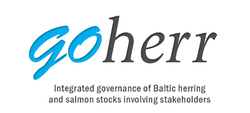Goherr/WP2: Difference between revisions
(Goherr public template added) |
mNo edit summary |
||
| Line 1: | Line 1: | ||
{{Goherr public}} | {{Goherr public}} | ||
WP2 Sociocultural use, value, and governance of Baltic salmon and herring | ==WP2: Sociocultural use, value, and governance of Baltic salmon and herring== | ||
'''Rationale''' | |||
WP2 will carry out a comparative study of the socio-cultural traditions and values related to salmon and herring, their use, and their governance. Anthropological research has long shown the importance and value of particular foods and environmental resources such as fish on society and culture. Such importance and values are informed and reified by culture, as is the use of these fish in society. Furthermore, the governance structures and institutions in place that inform the management and use of such resources will be investigated with suggestions on how they could be redesigned with input provided to WP 3 (Scenarios and management objectives) and WP6 (Building a decision support model for integrated governance). | WP2 will carry out a comparative study of the socio-cultural traditions and values related to salmon and herring, their use, and their governance. Anthropological research has long shown the importance and value of particular foods and environmental resources such as fish on society and culture. Such importance and values are informed and reified by culture, as is the use of these fish in society. Furthermore, the governance structures and institutions in place that inform the management and use of such resources will be investigated with suggestions on how they could be redesigned with input provided to WP 3 (Scenarios and management objectives) and WP6 (Building a decision support model for integrated governance). | ||
The objectives | '''The objectives:''' | ||
1. To understand the socio-cultural importance, value, and use of Baltic salmon and herring; | 1. To understand the socio-cultural importance, value, and use of Baltic salmon and herring; | ||
2. To apply these understandings to suggestions for the socio-cultural and political prerequisites for successful integrated fisheries governance; and | 2. To apply these understandings to suggestions for the socio-cultural and political prerequisites for successful integrated fisheries governance; and | ||
3. To understand what kind of institutional, organisational, structural and attitudinal flexibility is needed for integrated governance. | 3. To understand what kind of institutional, organisational, structural and attitudinal flexibility is needed for integrated governance. | ||
Revision as of 08:06, 9 June 2015
|
This is an archived version of a previous Goherr website. Goherr wiki main page
Official Goherr website
|
WP2: Sociocultural use, value, and governance of Baltic salmon and herringRationale WP2 will carry out a comparative study of the socio-cultural traditions and values related to salmon and herring, their use, and their governance. Anthropological research has long shown the importance and value of particular foods and environmental resources such as fish on society and culture. Such importance and values are informed and reified by culture, as is the use of these fish in society. Furthermore, the governance structures and institutions in place that inform the management and use of such resources will be investigated with suggestions on how they could be redesigned with input provided to WP 3 (Scenarios and management objectives) and WP6 (Building a decision support model for integrated governance). The objectives: 1. To understand the socio-cultural importance, value, and use of Baltic salmon and herring; 2. To apply these understandings to suggestions for the socio-cultural and political prerequisites for successful integrated fisheries governance; and 3. To understand what kind of institutional, organisational, structural and attitudinal flexibility is needed for integrated governance. |


